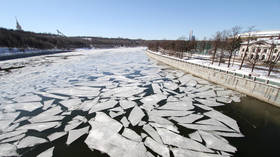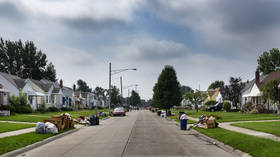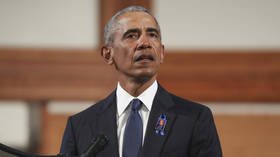It's clear there will be winners & losers from global warming. Russia shouldn't be ashamed of standing to gain from a warmer world

The West’s insistence that climate change will be terrible for everyone is just an ideology. In reality, as with all things, some people will gain and others will lose. Russia, it seems, could emerge in a far stronger position.
From mid-July to early August this year, my hometown of Vladivostok, in the country’s Far East, saw hot and rainless weather on a scale even the old-timers here had never seen before. In the day, temperatures hovered at just below 30C (86F), which, in combination with the humidity coming from the Pacific Ocean, made it an ordeal, especially for those who don’t have air-conditioning at home. The sea off Vladivostok warmed to 29С (84F), prompting warnings from scientists about the possibility of sharks swimming into the city’s bays.
Horror stories
The Far East is just one of the many Russian regions enduring abnormal temperatures this summer. In the Rostov region, in the south, a 41C (105F) heatwave led to power outages as residents turned on air-conditioners and fans. Yakutsk, the capital of the republic of Yakutia in Eastern Siberia, was blanketed by the smoke from huge wildfires, apparently induced by the unusually hot and dry weather in June and July.
Also on rt.com Putin says effects of global climate change disproportionately hitting Russia, as country battered by floods & raging wildfiresWestern media, led by its flagship newspaper the New York Times, predictably carried horror stories from Russia. According to those reports, the world’s largest nation faces the bleak prospect of being consumed by forest fires, while its housing and infrastructure will soon start to sink into the thawing permafrost. The not-so-subtle subtext of much of such reporting is that Russia probably deserves the climate-related calamities, as, “for years”, its leadership has rejected the fact that humans bear the responsibility for global warming.
It’s true that, until recently, the Kremlin, as well as the majority of Russian citizens, did not care about climate change, because they either didn’t believe in it or didn’t see it as something that could directly impact Russia. That has since changed. This year is shaping up to be the turning point. It has finally dawned on the country – both the political class and many ordinary citizens – that climate change is real, and we are already being affected.
There’s no doubt Vladimir Putin himself has begun to take climate change very seriously. In recent months, the president has repeatedly focused on the climate in his statements and public appearances. Meeting with the cabinet on August 5, he clearly stated that it was the cause of the recent wildfires and floods in the country. According to the Ministry of Natural Resources and Environment, the pace of warming in Russia is 2.8 times that of the global average.
Silver linings?
Coming to terms with the reality of climate change and its enormous challenges doesn’t mean Russia should focus only on the threats, while ignoring the benefits it could bring, however. The climate-change narrative currently dominant in the West largely downplays these upsides, while emphasizing the potentially disastrous consequences of global warming. Ironically, just last December, the very same New York Times ran a long read on the potential benefits of global warming for Russia’s agriculture.
According to a study by the Institute of Geography at the Russian Academy of Sciences, in 1961, as much as 63% of Russia’s territory had climatic conditions deemed adverse for humans. By 2010, due to the rise in temperatures, the unfavorable zone had shrunk to 50% of Russia’s landmass.
More research, conducted by scientists at the Siberian branch of the Russian Academy of Sciences and NASA’s Langley Research Center, concludes that global warming will make the climate of Siberia and the Far East more amenable to both life and agriculture. By the 2080s, scientists say, climates over Asian Russia, which makes up two-thirds of the country, are projected to get “much warmer and milder,” which could lead to a five- to seven-fold increase in the capacity of the territory to sustain a human population. This would result in a higher capacity for population density across the area, which is now sparsely inhabited, and make it more attractive for inbound migration.
A 2021 analysis by Princeton University economists predicts that, on average, world fundamental productivity will decline by 19% by 2200 due to rising temperatures. Brazil, Africa, India, Australia, and the Middle East will be the main losers, with declines in economic productivity of up to 60%. However, it will be a very different story in northern latitudes, including much of Russia. Parts of Alaska, northern Canada, Greenland, and northern Russia will see productivity double relative to what it would be without global warming.
Another recent study, authored by scientists from the United States, Canada, and Britain, looks at the areas that could become newly suitable for commercial farming as a result of climate change. They concluded that Russia and Canada had the greatest potential to become the globe’s new agricultural frontiers. Russia could add 4.3 million square kilometers (1.7 million square miles) of new farming land while Canada could add 4.2 million square kilometers (1.6 million square miles).
Not all good news
As for the downsides of climate change that Russia will inevitably face – and is, in fact, already experiencing – they are no doubt serious, but can be managed. Some 65% of Russia’s landmass is covered by permafrost, which is now beginning to thaw, threatening the buildings, roads, and other facilities and infrastructure that were built on it.
Also on rt.com Putin tells Biden’s climate change envoy that Russia & US can work together for their ‘common interests’ regarding global warmingHowever, the bulk of Russia’s population and economic activities is concentrated in non-permafrost areas. Only 15 million Russians live in the extreme north, which could be at risk of permafrost degradation, and there has been a shift in population as many people move south in search of better conditions.
There are engineering solutions to reinforce structures threatened by melting permafrost. They are expensive, but Russia could probably afford them if the problem gets really acute. Similarly, as the risk of forest fires grows with the rise of temperatures, there should be mitigation measures in place. This summer’s blazes in Yakutia might not have been that bad, had the state preserved its nationwide system to fight wildfires that existed during the Soviet era.
No one can predict with certainty the long-term effects of climate change. This is also true with respect to its impact on Russia. Yet there are reasons to expect that, on balance, the country could benefit from global warming, if it plays its cards right. The adverse effects of the climate crisis could be met with adaptation measures, from investing in the aforementioned national wildfire-fighting system and introducing drought-resistant varieties of crops to installing air-conditioning in every Russian household.
However, the money spent on the adaptation should be more than offset by the commercial and strategic gains Russia could potentially reap from the upsides of global warming. These include more amenable conditions in places previously unfit for human residence because of deadening cold, millions of square kilometers of newly available farmland, and an ice-free Arctic, making the polar seas a new Mediterranean – and one in which Russia has a controlling stake.
Coming out as a winner
In dealing with climate change, Russia wields another important advantage. Thanks to the enormity of its territory, it has 18 climatic zones that will be differently affected by rising temperatures. If there are areas negatively affected by the climate crisis, they can be compensated for by zones in which conditions become more amenable.
Some models predict that nearly a third of the global population may find themselves in extremely hot and uninhabitable – Sahara-like – conditions, generating hundreds of millions of climate refugees. Russia could become one of the main destinations to host people fleeing from extreme heat, droughts, and rising seas. As the Princeton study says, “Ultimately, the best way to adapt to global warming is … to migrate to regions that lose less or even gain from temperature increases. Many of these regions are sparsely populated today, due to their lack of amenities and productivity, but could be improved as temperatures rise and new migrants invest in them over the next centuries.”
Also on rt.com Daring Russian parachutists land in Siberia’s UNESCO World Heritage Lena Pillars Nature Park to manually fight wildfires (VIDEO)One option would be for the world to finance the resettlement of climate refugees in Russia through an international fund supported by rich governments and private donors. That could be another way for the country to monetize its climate-change advantages, boosting its flagging demographics in the process. The value, for the West at least, would potentially be to keep at bay a burgeoning climate refugee crisis that would divide governments and the public, and force, for example, the EU to make tough and unpopular decisions about people’s lives.
Keeping up the fight
However, despite this outlook, Moscow can’t turn its back on the fight against climate change. As a member of the international community, it must join efforts to combat the crisis, even if it means a considerable loss of the country’s oil and gas revenues because of the decarbonization of the global economy. In fact, decarbonization is a blessing in disguise for Russia, as it will induce the nation to get rid of its humiliating dependence on hydrocarbon exports and move towards a more diversified and innovative economy.
However, due to the time-lag effects of the planet's climate, global warming will continue during the next several decades, even if the world community miraculously manages to slash greenhouse gas emissions in the near term. There is nothing wrong in Russia, due to its geographic advantages, benefiting from climate change. Indeed, it should utilize global warming pragmatically and strategically.
The dominant Western discourse, asserting that climate change is equally terrible for everyone, is ideologized and smacks of hypocrisy. The actual geopolitics of the crisis, which is rarely talked about, will have its losers and winners. For instance, most climate models show that India will be one of the main victims of global warming, whereas China will be significantly less affected, with its northern areas probably even benefiting, so it stands to reason that the climate crisis will have a direct bearing on the balance of power between Asia’s rival giants.
In the late 19th century, a Russian emperor famously said Russia had two allies: the army and the navy. In the 21st century, its two main allies could be its nuclear weapons and global warming. The country’s vast arsenal of atomic warheads and rockets will keep it militarily powerful, while global warming could bring a new geo-economic significance to its vast, once-frozen wastes.
Like this story? Share it with a friend!
The statements, views and opinions expressed in this column are solely those of the author and do not necessarily represent those of RT.
The statements, views and opinions expressed in this column are solely those of the author and do not necessarily represent those of RT.














